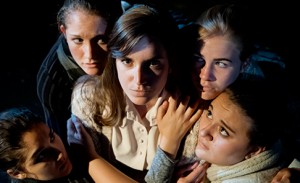- Skip to primary navigation
- Skip to secondary navigation
- Skip to main content
- Skip to primary sidebar
Melory Mirashrafi on Islam and The Crucible
Hannah Leone of the Hillsboro Argus/The Oregonian talks with student actor Melory Mirashrafi about her Iranian heritage and the connections between Iran and The Crucible. Read the full story online here or below!
By Follow on Twitter
on August 21, 2014 at 11:00 AM, updated August 21, 2014 at 11:04 AM
 Fear is a form of fuel for Hillsboro High School senior Melory Mirashrafi. She has been in Iran when people gathered in rebellion against strict Islamic boundaries, and witnessed police pull women and teenage girls into vans during peaceful protests that turned violent. She knows how heavy the weight of patriarchy can feel, and what dangers religious extremism can pose.
Fear is a form of fuel for Hillsboro High School senior Melory Mirashrafi. She has been in Iran when people gathered in rebellion against strict Islamic boundaries, and witnessed police pull women and teenage girls into vans during peaceful protests that turned violent. She knows how heavy the weight of patriarchy can feel, and what dangers religious extremism can pose.
As the reverend’s daughter Betty Parris inBag&Baggage’s upcoming production of “The Crucible,” Mirashrafi, 17, draws upon her transcontinental upbringing to understand how and why her character feels and acts. This connection is powerful, she said. Mirashrafi is acting in the play through the theater’s new pre-professional training program, which places high-school students alongside professional actors and tech crew.
“The Crucible” is based on Arthur Miller’s story about witch hunts in Salem, Mass., highlighting themes of evil, persecution, mass hysteria and guilt. A group of girls, including Mirashrafi’s character, go dancing in the woods and the results cause townspeople to suspect witchcraft. Characters throw blame and twist truth, out of misunderstandings driven by fear.
Mirashrafi is a first-generation American, with dual U.S. and Iranian citizenship. Both her parents were born in Iran. Her mother married in her 20s out of choice, but her grandmother had an arranged marriage at age 12 and her great-grandmother at age 9, she said.
Women in Iran are required to dress so that not much is visible besides their faces and hands. Some of them find ways to undermine the purpose of the law without technically breaking it, such as by wearing tight, patterned leggings or caking on makeup. But sometimes this results in an image that lacks the individuality they seek, perpetuating a generic face of Muslim young women in the rebellion, Mirashrafi said.
 Mirashrafi likens the Islamic government structure to the rigid puritanism in “The Crucible.” She has visited Iran 15 times, most recently this summer, and has hope things will get better. One year, her family decided not to go because the conditions of the rebellion were so dangerous. This summer she thought the country was better to visit, and the overall fear of religious policing didn’t feel as bad, she said.
Mirashrafi likens the Islamic government structure to the rigid puritanism in “The Crucible.” She has visited Iran 15 times, most recently this summer, and has hope things will get better. One year, her family decided not to go because the conditions of the rebellion were so dangerous. This summer she thought the country was better to visit, and the overall fear of religious policing didn’t feel as bad, she said.
Mirashrafi was brought up Muslim, but is personally unsure of her beliefs now that she has been exposed to so many different cultures, she said.
In a recent parallel trajectory between Mirashrafi’s international experience and the play, Iranian police arrested a group of teenagers for singing and dancing in a music video tribute to Pharrell Williams’ “Happy.”
In both scenarios, the people involved knew exactly what they were getting into. They knew they were breaking the rules, and they had a purpose, Mirashrafi said.
Scott Palmer, artistic director for Bag&Baggage, has noticed two specific aspects of Mirashrafi’s understanding of the play that set her apart from other actors working on “The Crucible.”
When he talks with actors about the height of the stakes in the show, how terrifying it is to be engulfed in such suspicion and constant dread, most show little familiarity with these feelings, Palmer said.
“But [Mirashrafi] has a clear and concise understanding of what it must have been like to live in an environment steeped in fear,” Palmer said, “never knowing who will come knocking on your door, when your family might be accused and when you, yourself, might find the finger pointed at you.”
Second, Mirashrafi is convincing as a young woman thrilled by the idea of rebelling against authority, Palmer said.
“When [Mirashrafi] is performing as Betty Parris in the woods, violating ‘the rules’ of the church and her father, there is an authentic sense of both joy and danger in her,” he said. “It is compelling to watch and experience.”
During one rehearsal, some of the cast went around in a circle and said why their characters were dancing in the woods despite knowing it was forbidden, what made them brave enough to do so.
Mirashrafi’s character, being the daughter of a reverend, needed to express rebellion against the extreme male religious presence in her life, Mirashrafi said.
No matter the play, Mirashrafi, like her peers, would still have jumped at the chance to work with professional actors through Bag&Baggage. Nor did her background affect her choice of character. But now, she thinks about her experience as motivation. Understanding how powerful a driving force fear can be helps her tap into her character and portray how everything is on the line in a way that is real and harsh, she said.
Stigmas pervasive in both Iran and “The Crucible” make Mirashrafi appreciate freedoms in modern day America, she said.
Mirashrafi’s favorite aspect of “The Crucible” is the “scary” female characters who know the power they possess.
“It’s not usually the position you see women in,” Mirashrafi said. “They know what they want.”
Mirashrafi also has a pretty good idea of what she wants. She’s interested in a medical career and is thinking of a college in southern California.
“The Crucible” runs Thursday, Friday and Saturday at 7:30 p.m. and Sundays at 2 p.m. from Sept. 5 through Sept. 28. A preview performance is at 7:30 p.m. Thursday, Sept. 4. Tickets range in price from $18-$30 and can be purchased online at www.bagnbaggage.org or by calling the box office at 503-345-9590.

Reader Interactions